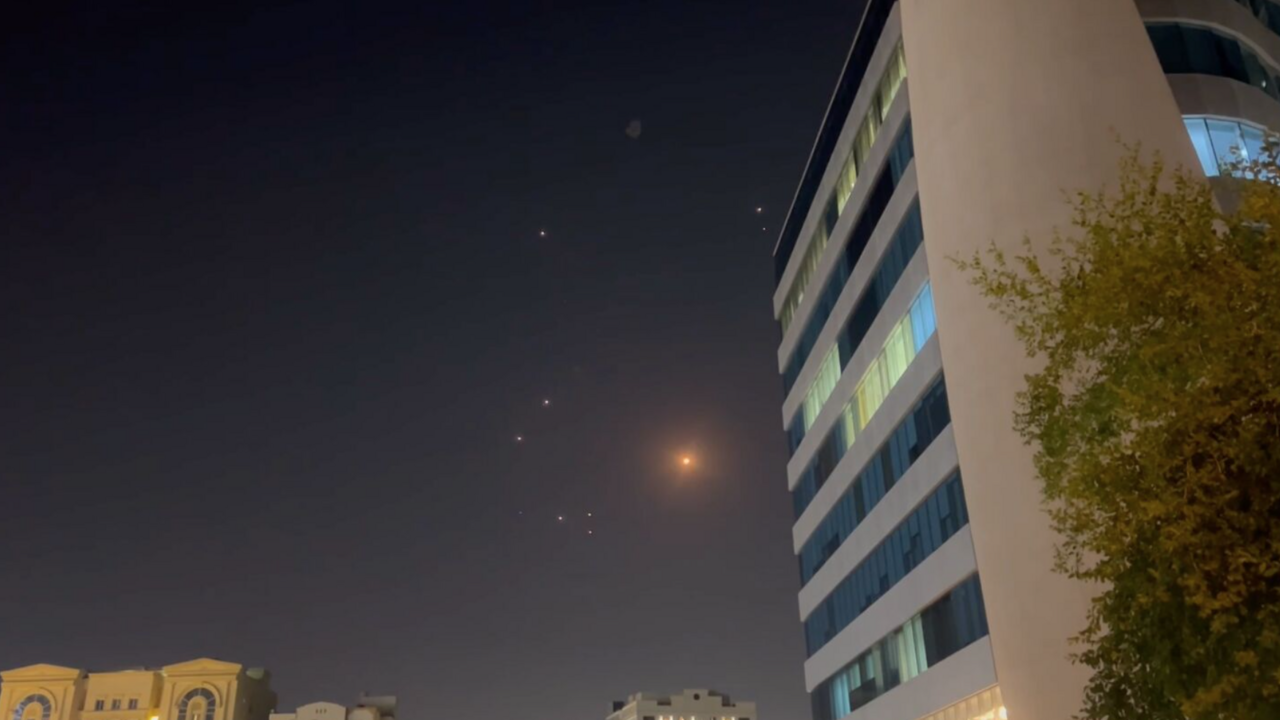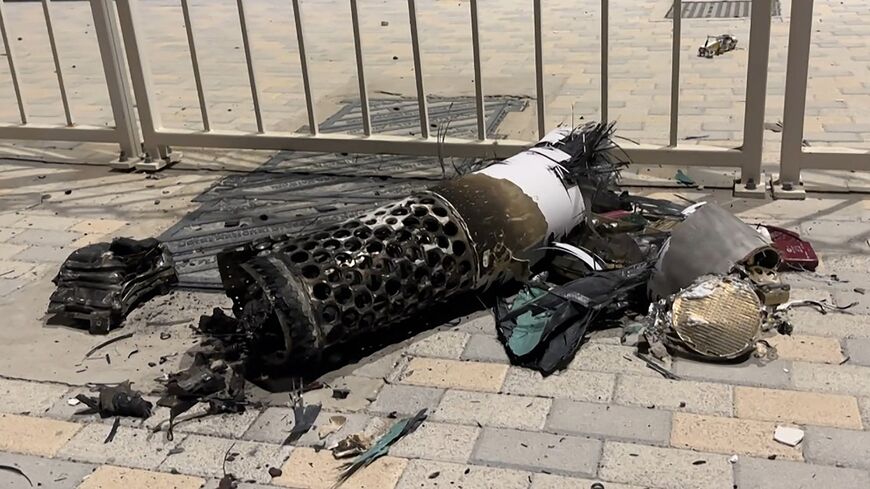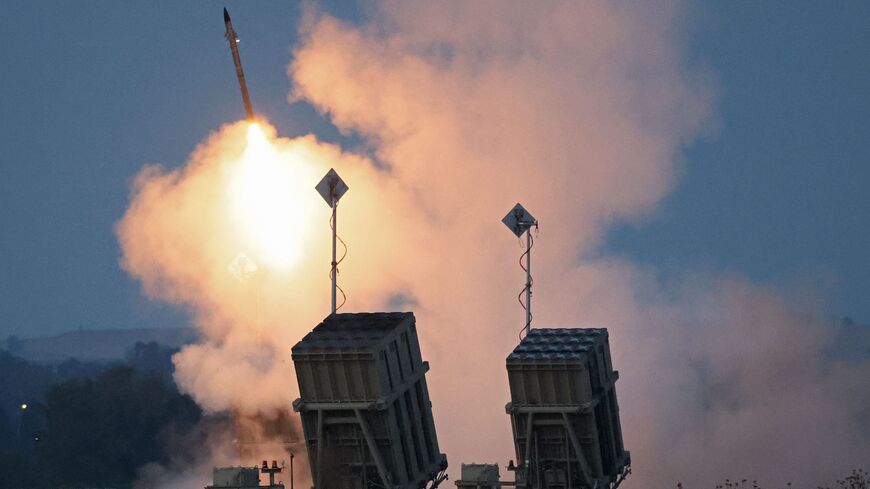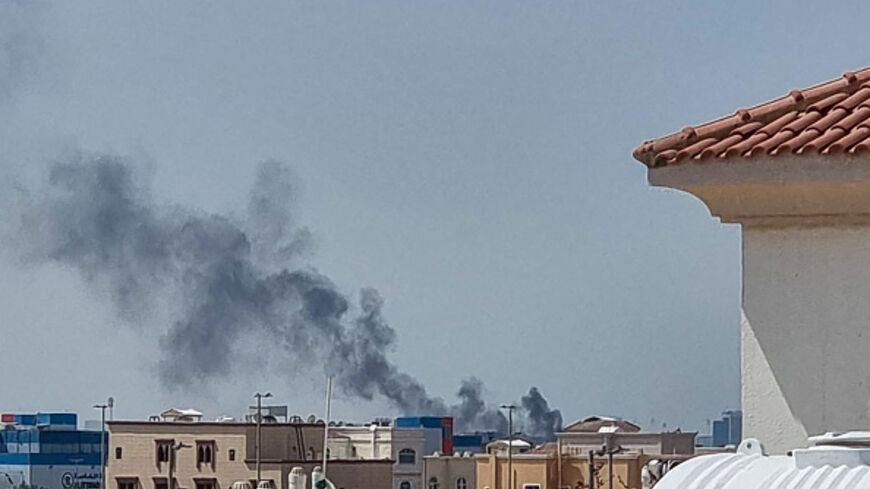Trump announces Iran-Israel ceasefire as IRGC targets Qatar's Al-Udeid
The US president announced a ceasefire between Iran and Israe would start Tuesday 6:02 p.m. EST (1:02 a.m. Tel Aviv; 1:32 a.m. Tehran Wednesday) after 11 days of fighting.

Iran’s Revolutionary Guard Corps conducted a missile attack against a US military base in Qatar on Monday, fulfilling its vow to retaliate against US strikes on Iranian nuclear sites.
Later on Monday, US President Donald Trump announced a ceasefire between Iran and Israel. In a post on social media, Trump wrote at 6:02 p.m. ET (1:02 a.m. Tel Aviv; 1:32 a.m. Tehran Tuesday) that a “Complete and Total CEASEFIRE” had been reached between Israel and Iran. The ceasefire will come into effect in approximately six hours after the two countries complete their “progress, final missions.” The war will officially be over in 24 hours, Trump added. A senior Iranian official has confirmed to Reuters that Iran has agreed to a ceasefire proposal. The deal was mediated by Qatar, a US official confirmed to Al-Monitor.
Israel launched strikes against Iran on June 13, targeting military, nuclear and energy sites. Iran responded by firing barrages of missiles and drones into Israel. The back-and-forth attacks are the deadliest between the two, killing at least 430 Iranians and 25 Israelis.
What happened: Nearly five hours before Trump's announcement, IRGC said it targeted the US’ Al-Udeid Air Base in Qatar in “a powerful and devastating missile attack.” In a statement published by the semiofficial Tasnim News Agency at around 8:00 p.m. Doha time (1:00 p.m. ET), the IRGC called the attack a "clear and explicit" message to the White House, emphasizing that Iran "will not leave any attack on its territorial integrity, sovereignty and national security unanswered under any circumstances."
Iranian reports differed on the number of missile impacts at Al-Udeid. Press TV reported at around 8:30 p.m. Doha time that at least six missile impacts were reported at the base, while Mehr said at around 8:45 p.m. Doha time that three missiles had hit the base.
This frame grab taken from AFPTV footage shows the remnants of an Iranian missile intercepted over Qatar, as it lies on a pavement near a fence on June 23, 2025. (AFPTV/AFP via Getty Images)
The attack appeared to end at roughly 9:00 p.m. Doha time (2:00 p.m. ET), roughly an hour after the initial reports of missiles.
The moment Iran fired missiles at US-run al-Udeid base in Operation Tidings of Victory in response to US attack on the country's nuclear facilities
— Press TV 🔻 (@PressTV) June 23, 2025
Follow https://t.co/B3zXG74hnU pic.twitter.com/eObFO5856D
Iran’s National Security Council said that "the number of missiles used in this successful operation was the same as the number of bombs that the United States had used in attacking Iran's nuclear facilities.”
The United States struck Iran’s Fordow, Esfahan and Natanz nuclear facilities early Sunday morning local time in what President Donald Trump called a “very successful” operation. The United States dropped 14 bunker-busting bombs and launched over two dozen Tomahawk missiles in its strike. Iranian officials downplayed the damage afterward, and the IRGC vowed to retaliate.
A statement from Qatar’s Ministry of Defense said that the country’s air defenses “successfully intercepted a missile attack targeting Al-Udeid Air Base.” It is unclear how many missiles were intercepted.
In a post on Truth Social following the attack, Trump said Iran's response to the US' strikes on their facilities was "very weak." According to the president, Iran fired 14 missiles — 13 of which were “knocked down.” Another was “set free” because it was not a threat and there were no casualties, he said.
Trump encouraged Iran to make “peace” after the attack and thanked the Islamic Republic for warning the United States ahead of time.
Trump held a meeting with his national security team at around 1:00 p.m. ET and then thanked the emir of Qatar, Sheikh Tamim bin Hamad Al Thani, in another X post, noting “all that he has done in seeking Peace for the Region.”
Iran has officially responded to our Obliteration of their Nuclear Facilities with a very weak response, which we expected, and have very effectively countered. There have been 14 missiles fired — 13 were knocked down, and 1 was "set free," because it was headed in a…
— Unofficial Trump on X (@trump_repost) June 23, 2025
Posting on X shortly after the attack, Iran’s supreme leader, Ayatollah Ali Khamenei, said, “We didn't harm anyone. And we will not accept any harassment from anyone under any circumstances.” Khamenei did not directly address the strikes on Al-Udeid in the post.
Al-Udeid Air Base is the largest US military base in the Middle East. The 60-acre base hosts US Air Force aircraft, including KC-135s, C-17s, C-130s and the Patriot defense system, as well as the air forces of Qatar and the UK. Al-Udeid serves as the regional headquarters for US Central Command. There were roughly 8,000 US troops stationed there prior to the outbreak of conflict between Israel and Iran earlier this month.
Following the latest conflict between Israel and Iran, however, the base was at least partially evacuated, Al-Monitor’s Jared Szuba reported.
Qatari Foreign Ministry spokesperson Majed Al-Ansari said in a post on X that the attack is a “flagrant violation of the sovereignty of the State of Qatar, its airspace, international law, and the United Nations Charter.”
He added that Qatar “reserved the right to respond directly in a manner equivalent with the nature and scale of this brazen aggression.”
The Iranian National Security Council emphasized that the attack did not pose any threat “to our friendly and brotherly country, Qatar” in its statement. Axios and the New York Times reported that Iran gave Qatar advanced notice of the strike.
Regional condemnation: The Saudi Foreign Ministry denounced Iran’s attack, calling it a “flagrant violation of international law” in a statement. The attack, the kingdom added, was “an entirely unacceptable act that cannot be justified under any circumstances.”
#Statement | The Kingdom of Saudi Arabia expresses its condemnation and denunciation, in the strongest terms possible, the aggression launched by Iran against the brotherly State of Qatar, which constitutes a flagrant violation of international law and the principles of good… pic.twitter.com/XHueCFXRcc
— Foreign Ministry 🇸🇦 (@KSAmofaEN) June 23, 2025
The United Arab Emirates said it condemned the Iranian attack “in the strongest terms,” the official news agency WAM reported.
Bahrain condemned the attack in a statement carried by its official news agency and “expressed its unwavering support of Qatar.”
Kuwait’s Foreign Ministry expressed its “strong condemnation and denunciation” of Iran’s attack in Qatar, saying in a statement that it “threatens peace, security and stability in the region.” The ministry added that Kuwait “expresses its readiness to harness all its capabilities and energies to support the sisterly state of Qatar.”
Oman’s Foreign Ministry issued a statement that condemned “the ongoing regional escalation,” noting that it was “caused by Israel’s illegal missile attack on the Islamic Republic of Iran on June 13 and the ongoing exchange of missile attacks since then.”
Lebanon’s president, Joseph Aoun, also condemned the attack, saying that it was “a violation of the sovereignty of a sister nation and a step that will increase tensions in the region and expand the scope of military confrontations.”
The Palestinian Authority called the attack a “flagrant violation” of Qatar’s sovereignty and said it “stands by the side of the State and people of Qatar,” the PA’s news agency, WAFA, reported.
The Syrian Foreign Ministry expressed solidarity with Qatar and said it “strongly condemns any hostile acts targeting the security and stability of the Arab Gulf countries,” the official SANA news agency reported.
The Iraqi Foreign Ministry said it is "following with great concern the dangerous and accelerating escalation in the region." The ministry expressed "solidarity" with Qatar but stopped short of condemning Iran.
Region on alert: Qatar announced the closure of its airspace at 6:30 p.m. local time (11:30 a.m. ET). Kuwait, Bahrain and Iraq later followed suit.
Kuwait and Bahrain announced at around 11:00 p.m. local time (4:00 p.m. ET) that their airspace had reopened. Qatar Airways announced at 12:20 a.m. local time on Tuesday (5:20 p.m. ET Monday) that Qatari airspace had reopened. Iraq did not immediately announce whether its airspace had reopened. The flight tracking website Flightradar24 showed a few planes over Qatar and off its coast at 11:20 p.m. local time (4:20 p.m. ET).
Airspace clearing following Iranian missile launch at Qatar today. pic.twitter.com/BghvL4k0il
— Flightradar24 (@flightradar24) June 23, 2025
Turkish Airlines suspended flights to and from Doha, Manama, Dubai, Abu Dhabi, Dammam, Kuwait and Muscat on Monday, Turkey’s official Anadolu Agency reported. It was not immediately clear how long the suspensions would last.
Emirates, Etihad and other airlines canceled flights to Iran, Iraq and other parts of the Middle East earlier on Monday amid the regional tensions.








